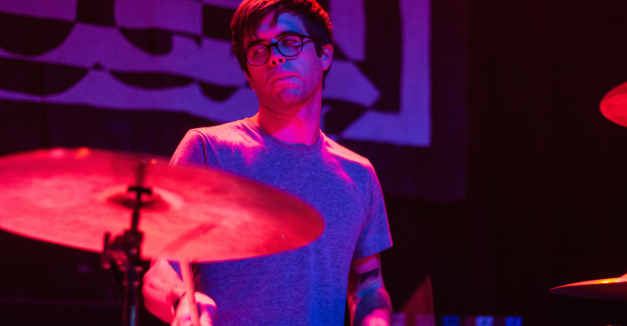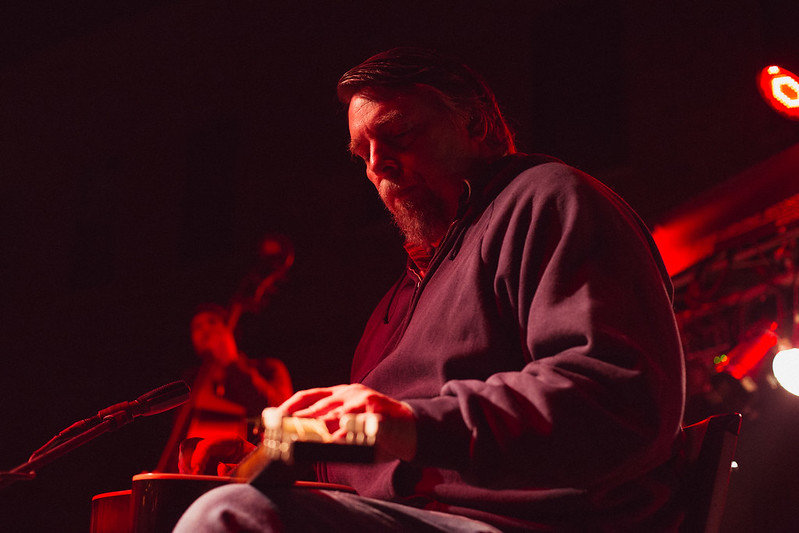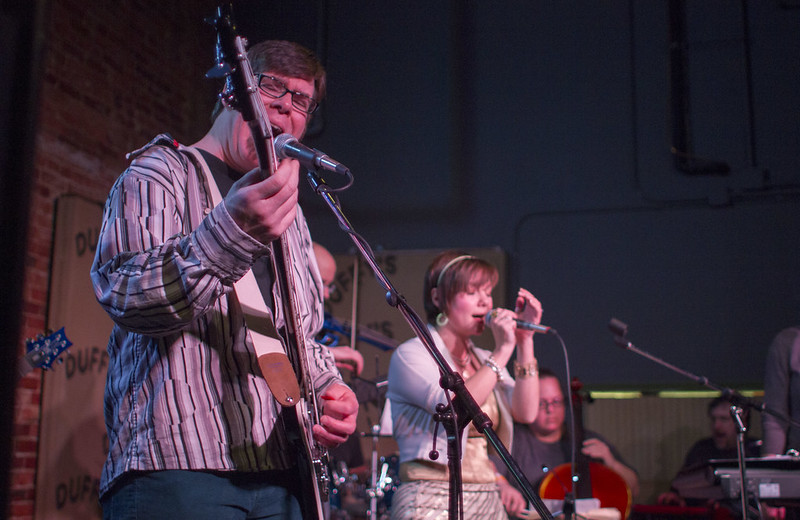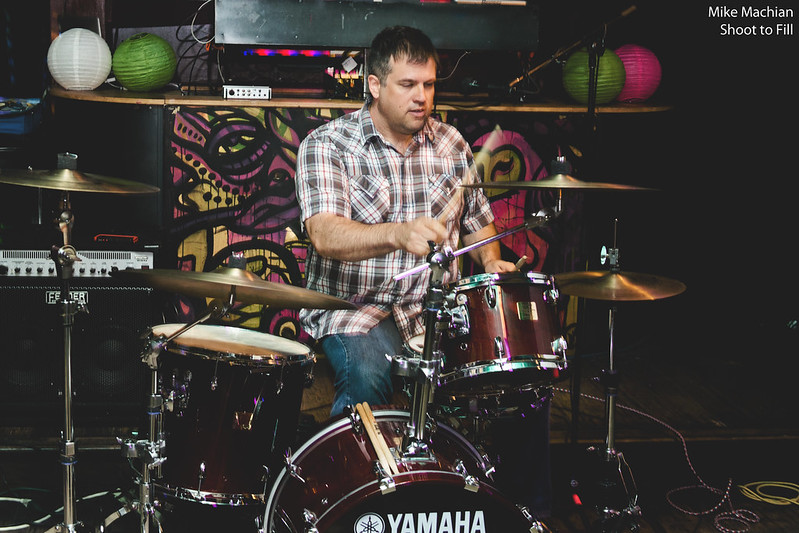Last week, we spoke to six Nebraska musicians beloved in their scenes and by their many bandmates, but who rarely attract the spotlight. We thank you for the nice response and suggestions for a sequel.
Here it is: From the ’00s Lincoln favorites to the Benson stalwarts to the Nebraska transplant with a rich Nashville history.
We’re open to a third installment of this series if you have more suggestions. Leave them in the comments.
Ian Francis
Currently: Yesh, Low Horse (drums)
Formerly: Good with Guns, Beep Beep, The Machete Archive, Farewell Show For Megan, touring with Pharmacy Spirits, Eli Mardock (drums)
photo by Natasha Richardson | questions by Andrew Stellmon
Hear Nebraska: What is different for you about drumming in a band that features vocals from one that had none at all?
Ian Francis: Without vocals, the music is missing the element that most people connect with automatically. Even if you tend more toward listening to a bass player or guitar player, there’s that prominent melody that isn’t there. So for instrumental bands it’s important to fill out that space and create depth and texture to keep your listeners engaged and give them something to identify with. For me, I try to make my parts more subtle and supplemental, but the lack of vocals just gave each of us a way to open up and find more creative ways to provide that texture.
HN: In 2012-2013 you played in three active bands to our knowledge (Machete, Classes, and Low Horse), but for most of the last year or so we haven’t seen you in any active bands. What have you been up to, and have you experimented with anything musically in the time off?
IF: I’ve played some gigs with Eli Mardock, but my main focus has been to finally finish my bachelor’s degree. I do currently have a new project with some friends called Yesh. We will be playing at the Bourbon Theatre on Nov. 29 as part of the Boximus Maximus thing.
HN: Saber is known for flailing about and drawing the attention of the crowd regardless of what band he’s playing in. Have you ever caught yourself accidentally watching him from behind your kit? What is that like?
IF: Two things that are crucial during a live performance are communication and awareness. It’s very important to pay attention to what everyone else is doing so that the parts can fit together. We all had our ways of getting into the music and expressing ourselves, and while his was the most visually stimulating, I was definitely always more focused on what was happening with the music than Saber’s feet.
* * *
Molly Welsh
Currently: Mother Molly and the May I’s, John Klemmensen and the Party, All Young Girls Are Machine Guns (vocals)
photo by Chevy Anderson | questions by Jacob Zlomke
Hear Nebraska: How did you get into music performance?
Molly Welsh: I have a live theater background, so I was in musicals in college and that sort of thing. I played bass in a band when I was 19 in Texas, but that didn’t last very long. When the Encyclopedia show came about (Katie F-S & Andrew Eck), I joined with Aetherplough for the Encyclopedia show about space. They had this really cool piece where a computer voice read the Wikipedia entry for the space treaty and after about 30 seconds, a woman in the audience stood up and started singing the female part from Pink Floyd’s “Great Gig in the Sky.” Then, another woman stood up and started singing with her. And then another and another. I was the last one to get up and each woman was supposed to break down the song just a little more than the one before, so by the time I stood up, I was just wailing loudly from the back of my throat. We found a way to bring the piece to a close and that was it. People were a little weirded out by it.
The next day, I got a phone call from Rebecca Lowry (of All Young Girls Are Machine Guns). She said she needed my voice for something. I told her she must have the wrong number. I am not a singer and she must have made a mistake. She assured me she was not making a mistake and that she needed me for the next Encyclopedia Show. The topic was mythical creatures. She wrote a siren song. We had a blast working on it and just before we went on stage to perform it, she asked me if I wanted to be in the band.
The harmonizing thing that I’m good at came about singing with my mom in church. We would always sing the harmony while the rest of the congregation sang the melody.
HN: As a vocalist, do you alter your approach based on who you’re singing with?
MW: My approach totally changes based on who I’m singing with. Each of the singers I’ve worked with have a different tone and they use their breath differently. I try to match them as much as possible (or contrast them, whatever the song calls for).
HN: Why do you prefer singing over, say, playing guitar?
MW: I prefer singing over playing an instrument on stage because I am super comfortable with my voice as an instrument. A large part of my theater training was vocal, so I learned how to feel the notes I am singing and how to place them in certain parts of my body. A lot of the harmony I sing on older songs is body memory and even if I can’t hear myself, I can feel if I am hitting the correct note because of the way my voice resonates inside my body. I am not as comfortable with an instrument like the guitar because then I would have to trust my hands. And I’m not as good as the people I play with so I stick with the voice. And I can practice in my car. Can’t really do that with a guitar.
* * *
Mike McCracken
Currently: Shawn Cole, The Bottle Tops, Lloyd McCarter and the Honky Tonk Revival, Zoo Bar House Band (occasionally), Blues Messengers, Emmet Bower Band, Sue Murray, Doodley Squat, Little Joe McCarthy (lap steel and/or guitar and/or dobro)
Former Highlights: Three shows with Charlie Daniels, house gig at BB Kings in Nashville, “Blue Plate Special” radio show, bandleader of Hollowgram Records
photo by JP Davis | questions by Chance Solem-Pfeifer
Hear Nebraska: I’ve probably seen you play most often with The Bottle Tops. They clearly love to leave you a lot of real estate to solo. What’s the balance like for you between a solo that’s a real exhibition of speed and playing in service to another person’s song where you need to blend and think about your place in the tune?
Mike McCracken: I am blessed to play with bands like the Bottle Tops who believe in and excel at original music. That’s the cool part of my responsibility with whatever instrument I use. I listen to several aspects of a song: words, composition, musical interaction with the band members. A great song slightly and positively morphs every time it’s played in front of an great audience. Now, the fact that a song is written at 180 bpm, might make my solos sound a bit “notey.”
HN: Do you enjoy the sort of hired gun position of Nebraska bands knowing that if they want lap steel or dobro in this state that you’re right at the top of the list? As opposed to, say, “I’m a member of these three bands, and that’s it.”
MM: I’ve always enjoyed challenges and strive to be the best I can. There are some fantastic musicians here in the Midwest. My mantra for being considered on such a list has to include some basic requirements. I want a band or studio to know that if/when they hire me, I will show up sober, positive attitude, on time, dressed appropriately, proper equipment, with their songs charted out and practiced if possible. I think these things will help anybody make such a list.
HN: People like Lloyd and Mike Semrad, when I’ve been around them, are often quick cite your Nashville days. When did you move to Nebraska and why?
MM: I offocially moved in April, 2011. I had stayed at a friend’s house for a month or so here in Lincoln trying to see if it would be feasible to live in the Midwest and keep making a living playing music. What brought me back here was being closer to family. My parents live in a small town that is on the Kansas/Nebraska border just south of Fairbury. I felt Lincoln/Omaha area would be a good place to land closer to them but still have musical opportunities. 100 miles to travel to see them is a heck of a lot better than 800 miles. Nashville will alway be there. My parents won’t.
HN: What was the biggest lesson or observation you took away from doing session work in Nashville?
MM: As my college football coach used to say, “There are graveyards full of people who thought they couldn’t be replaced.” In Nashville, there were 20,000 musicians per square mile. I was lucky enough to work in many studios mostly doing demo work. To get to that point though, I had prove to the studio that I was the person for the job and not the other 20,000. Ha! Networking is a must. Proficiency is a must. For these studios, as well as the artists who would hire me, time was money. If they knew I could do my part in one take, as opposed to somebody who might do seven takes, I would get the phone call.
* * *
Tery Daly
Currently: Floating Opera, The Static Octopus (formely and briefly called Creatures Of Habit and Starboy), Magma Melodier (bass, guitar, vocals)
Formerly: The Atomic Pigs,The Honey Hush, The Flaws, Suzy Dreamer & Her Nightmares, The Master 8000, Loup River Band & Street Choir, John Wesley Crusher, Medium Walter, The Candle Simon
photo by Michael Todd | questions by Andrew Stellmon
Hear Nebraska: The speed and clip of Static Octopus is different from how Magma Melodier spreads out. How does each one challenge you?
Tery Daly: I don’t think of any of it as a “challenge” per se, more of an opportunity to exercise and indulge different parts of what I love to do. The Static Octopus, has a ‘60s Pop/British Invasion/’70s Power-Pop/Contemporary indie-pop sound, which is closest to my heart. And Magma Melodier [which releases its new album at Zoo Bar this Saturday and in Omaha the next Saturday] is kind of timeless Americana with a heavy edge, I love both styles of music, so being in both bands allows me to play many different styles of stuff I love. Adding Floating Opera, who I also play with, into the mix, a chamber pop band along the lines of The Magnetic Fields/Belle & Sebastian/Decemberists/Arcade Fire, adds yet more color and musical outlet for me. So “musical outlet” is a big part of it.
There are also other elements, as well. In The Static Octopus, I write the songs. In Magma Melodier Jeff Iwanski writes them. And in Floating Opera Richard Rebarber and Charles Lieurance do. It’s a very different thing creating and arranging your own work than it is working with someone else’s songs, both are great fun to do, but very different. In some ways, it’s more enjoyable working on someone else’s songs because you approach them from a completely different side of your brain/heart/personality than you do your own songs. I get arrangement ideas for Jeff’s songs or Richard’s songs that I would never do for my own songs because their songs lend themselves to those elements in a way mine never would. I’m fortunate enough to play in their bands because even if I weren’t, I’m a huge fan of their work, so getting to participate with it and contribute to it makes it even better for me.
Another thing is that I sing lead in TSO, whereas in MM and FO I’m a backing vocalist, which I confess is my preference. I have no problem singing lead, but I’m just more comfortable and prefer doing harmonies. I guess all these different things just allows me to access and exercise different parts of my musical brain and heart, which, for me, are one and the same.
HN: Vocal harmonies play prominently in each of the bands in which you play, and you are a major contributor to that. What draws you to exploring those aspects?
TD: Honestly, it’s just a gift I received at birth, which I am forever grateful for. Both my parents were musical, from musical families. When I was a little kid, I listened mostly to oldies radio and loved the music of The Beatles, The Beach Boys, The Hollies, The Turtles, The Zombies. All these bands that had three, four, five, six part harmonies all throughout the songs, and from as early as I can remember, I was always able to pick out and sing along with each different vocal part. That style of writing/arranging is what appeals to me the most and comes the most naturally to me, so whether it’s a song I’m writing/arranging or I’m working on parts for a new Magma Melodier or Floating Opera song, I’m always hearing lots of harmony vocal parts and backing vocal parts. Every song is a puzzle made up of lots of different pieces, all put together. I don’t just like to look and the pretty picture when it’s all done, although that’s great, I much prefer to get up close and personal with every single piece of it and appreciate it both for its individuality and for its contribution to the whole.
HN: Magma Melodier was just recently on Hear Nebraska FM. You told Chance in that interview that you were looking to join the band because you were only in two others at the time. What interests you about taking on that kind of workload?
TD: At one point in about 2009 or so, I was in six bands at one time, the most I was ever in at once, but at that moment in my life, it totally worked. I’m only in three now, and schedule-wise that’s the most I could possibly do right now. It’s not necessarily that I’m looking for that kind of workload, I just love playing and singing and making music. If I could do it 24/7/365 I would! I always found myself getting bored pretty quickly being in one band that only played one style of music because I like such a wide variety of styles. I love jazz, but I’m not currently playing any jazz. On Floating Opera’s next album there’s a song called “Pioneer Fiction,” which is about as “prog-rock” as FO has ever gotten. When I heard the demo of the song, I re-recorded it at home, changing the end of the song to a kind of swingy jazz-prog kinda thing, and when I played it for Richard, he was kind of like, “Wow, I never heard it that way, but I like it.” So that’s how we’re doing it, and it was just something I heard in the song that I thought it needed. The jazz lover in me reared its head at that moment, and was sated. Sometimes it’s the punk rock lover, or the heavy metal lover, or the western-swing lover. Whatever musical itch needs to be scratched makes itself known.
I also play lots of different instruments: guitar, bass (pretty much any/all stringed instruments) drums, enough keyboards to get my point across when I need to. If I go too long NOT playing a particular instrument in a band I start to really miss doing that, so I go looking for a band who needs that instrument. I’m actually not drumming live in bands anymore because last time I was doing it, it starting taking a noticeable toll on my hearing/tinnitus. I still drum on recordings, but not live anymore. Wear your ear plugs kids, I wish someone had told me that when I was 16 and I’d started then, instead of waiting until it was too late.
* * *
Scott “Zip” Zimmerman
Currently: Nightbird, Matt Whipkey (Whipkey Three, Whipkey/Zimmerman), Citizen’s Band, Virginia Tanous, aetherplough, The Way Around (drums)
Formerly: Sarah Benck & The Robbers, All Young Girls Are Machine Guns, Kelsey Nord Band, Ground Tyrants, Dylan Davis, The Get, Planet Butter, Tsumi, The Coopers, New Atomic Robert (N.A.R.), Fuel Tank For A Sex Machine
photo by Mike Machian | questions by Chance Solem-Pfeifer
Hear Nebraska: Wanted to start with “1:59” and zoom out from there, the Whipkey song from Underwater that Hear Nebraska premiered a couple weeks ago. You’re kind of the star of that song’s first 20 seconds! And I think you can extrapolate your pretty integral place in Whipkey/Whipkey Three songs in general. How fun is it to play that brand of classic-feeling, eyes-ahead rock where the cliché about drummer as backbone really holds true?
Scott Zimmerman: Yes, it’s super fun! I really enjoy playing all of Matt’s songs, but that one in particular is fun to play because the beat I came up with is so simple. I have plenty of technique, but these songs don’t need someone Neil Peart-ing all over them. When I play with songwriters like him or Sarah Benck, I try to provide that backbone like you mention. But I also like to help define the form of the song, changing things up during the chorus or bridge, building or dampening the intensity when we transition from one section to the next. One time when I was rehearsing with The Filter Kings, someone in the band said, “It’s like you conduct the song,” and I took that as compliment. I hope he meant it as one.
HN: What’s your personal favorite drum-fill you’ve ever recorded on a Nebraska song?
SZ: On Planet Butter’s CD More Crash, Less Burn from 2001, track #7 is called “Suga’ Mama”. From 2:18-2:49, there are a ton of fills/solos. I like the first and last ones during that section. I’m also featured as the lead vocalist during all the verses, and no one in the band had heard me sing before I came in and recorded my part. I did alright for my first time.
HN: From Nightbird to Whipkey to formerly playing with All Young Girls, there’s a lot of different corners of rock and pop music going on on your resumé. Does that fulfill a genre taste diversity for you? Or do you look at it more technically, as in you’ll very literally get to do different kinds of drumming?
SZ: The variety of genres I play isn’t intentional. The primary reason I started making music with the people I do, is because I like them. Nightbird started out when Jeff Harder shared a live concert of Sleep, and we talked about how much we wanted to play that style of music. I knew Lee Meyerpeter from when I filled in with The Filter Kings a few times; He and I had discussed our love of classic “stoner rock” in the past, so I brought us all together to make music. Citizen’s Band are friends I’ve known since college band that share a love of funk, rock, and jazz. I started playing with Matt Whipkey because he was going to open solo acoustic for Sarah Benck & The Robbers at Knickerbockers, and asked if I’d learn a few of his tunes and sit in. Matt and I had both worked for Dietze for a long time at that point.
HN: Last one, out of curiosity, how did you earn the nickname “Zip”? It’s been included every time I’ve heard or read about you.
SZ: Zip is a nickname I was given when I was a freshman in the UNL Drumline in 1989, and it’s really stuck! It was actually “Zipper” at first, but eventually got shortened. I’ve discovered that “Zip” is not an uncommon nickname for people with the last name Zimmerman. When I lived in Lincoln, there was another Scott Zimmerman with that nickname too, which is complete bullshit. FYI, I’m not the guy that ran for Lt. Governor as a Libertarian, though he is a drummer. If he would have won, I could’ve gotten out of so many speeding tickets!
* * *
Dave Ozinga
Currently: Son, Ambulance, Ted Stevens Unknown Project, Caravat and Healer (drums)
Formerly: UUVVWWZ, Shipbuilding Co., Carrot Carrot, Husbands, Well-Dressed Man Disguise, Black Hundreds
photo by Daniel Muller | questions by Jacob Zlomke
Hear Nebraska: How do you use percussion to enhance a song?
Dave Ozinga: Each song, theme, movement, whatever — it is unique and needs to be approached in its own way. Maybe you want to enhance it, but you also need to know when to leave it alone, or when to cut it up, throw it off balance, or even just end it. I can’t answer that question because there are too many answers.
Seriously, sometimes I will just play a straight beat, nothing ornamental or anything, because I’m afraid of messing with a song. Like, the songwriting itself is good enough. I don’t want to get in its way, but someone still has to keep the time. So I do that, I don’t enhance it, and therefore it is enhanced. With that said, I can also be a total spazz behind the kit, and I’ll try for that perfect fill or I’ll switch into odd time signatures without telling anyone. There’s a lot of notes to mess with, a lot of space in there to feel out. Fills, crashes, single hits and whatnot — if placed perfectly (or imperfectly, depending on what you’re going for), can totally change that space of the song, and thats pretty powerful if they make sense.
HN: What’s the common thread between your different projects? Why have you been drawn to them?
DO: Fantastic, eccentric songwriting is probably the only common thread! Seriously though, that’s why I play with these people. That, and because it’s exciting to be challenged, and I get terribly bored just playing a single style or genre. I want to play and write everything I love to listen to: pop music, jazz, heavy heavy rock jams, kraut, space rock, doom, baroque pop, punk, country, surf, whatever. I think it’s pretty hard to have a band that can pull all of that off, unless you’re Ween or Ariel Pink, so I just do my best, learning as I play with all these sweet dudes and ladies.
HN: As a percussionist, how do you view your role in the songwriting process?
DO: I’ll go back to what I mentioned earlier: sometimes you just can’t mess with a great song. In cases like that, my role is minimal, and I just keep the time and try not to screw it up. It’s more fun when its a collaboration, and we’re working things out together. Typically, I’m making conscious decisions about tempo and dynamics every time I start playing. They’re both absolutely vital, and just as important as the melodic aspects of the song, especially in the finished product. As a drummer, I usually don’t write the melodies, or the lyrics, but I feel responsible (along with the bass player) for the overall feel of what’s happening. Like, a groove, or a lack of groove, or whatever. And that makes them our songs, too.










